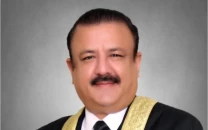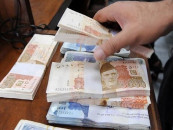Jamal-e-Khusro: Interpreting Sufi poetry through fluid moves
Kathak dancer Nighat Chaudhry vows audience with solo performance.

Famous Kathak dancer Nighat Chaudhry presents a solo performance on Thursday evening. PHOTO: EXPRESS
The sound of ‘ghungroos’ announced the footsteps of young women as they made their way to the stage, nervously. Clad in a white and silver ‘pishwaz’ and ‘churidaar’, (traditional South Asian Subcontinent dress) they joined renowned Kathak dancer Nighat Chaudhry to take a bow before the opening performance. With their intricate footwork and powerful expression, they moved effortlessly to the rhythms of Amir Khusro’s poetry, in communion with the cosmos.
Titled “Jamal-e-Khusro,” the event was organised to pay tribute to the legendary poet, mystic and musicologist Amir Khusro Dehlavi (1253-1325 AD) and was the second in a series of a week-long festival to commemorate his 688th death anniversary at Kuch Khaas on Thursday. From among many of his contributions to the cultural heritage of the Indian Subcontinent, Khusro is famous for inventing ragas (musical notes) and musical instruments like the tabla and the sitar. He is known to have composed around 100 musical pieces in Persian, Hindi, Sanskrit and Urdu, of which about 20 still exist in one form or another. Much of his work reflects his years spent as the vizier at the courts of seven kings of the era.

A subsequent literary gathering featured the orators Tajdar Zaidi and Taimur Rehman accompanied by Wajihul Hasnain Nizami on sitar and Sajawal Khan on tabla. Together, they narrated the life story of Khusro intertwined with that of his spiritual mentor Khwaja Nizamuddin Auliya whom he harboured great admiration for. Amid accounts of devotional exchanges between the master and the disciple, the performers stringed together poetry and music, punctuated by memorable songs like “Chaap tilak sab chheen li re,” “Aaj rang hai rang hai,” and “Bahut kathin hai daggar panghat ki.” They also read out some of Khusro’s poetry as translated by Shahid Hussain Tareen, grandson of the revolutionary poet Josh Malihabadi.
In the finale, Chaudhry stunned the audience by a solo performance of Abida Parveen’s “Maula rang de,” displaying command over movement and expression. Later, the Kathak dancer told The Express Tribune how her students had had little time to prepare for the performance but were excited nevertheless to be a part of it.
“Performing art is an experience that has to be felt through the senses and cannot be summed up in words…It is a truth which is either there or is not,” she said in a cryptic tone.
An audience member from the diplomatic community said she found the performances extraordinary even though she did not understand the poetry in Urdu and Persian. The festival has been organised by Kuch Khaas in collaboration with the Institute for Preservation of Arts and Culture.
Published in The Express Tribune, September 14th, 2013.


















COMMENTS
Comments are moderated and generally will be posted if they are on-topic and not abusive.
For more information, please see our Comments FAQ